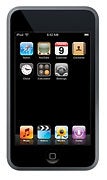To build and develop career www.careerbd.net
perfume presents personality www.perfumeplus.zlio.com

Just 74 days after launching its iPhone, Apple announced it had already sold 1 million of the things - a milestone that its previous blockbuster product, the iPod, took almost two years to reach.
And yet, to judge by the industry's chatter, the iPhone is already old news. More excitement swirls around rumours that Google, the Web-search giant that is Apple's neighbour in Silicon Valley, could enter the market with its own "gPhone." Google's boss, Eric Schmidt, has already said that the firm plans to bid for a prime slice of the wireless spectrum in a forthcoming auction, something Apple is also said to be considering.
In short, both mobile operators and handset-makers could soon be confronted with two of the world's sexiest brands as direct rivals. Publicly, Apple and Google are being diplomatic.
The industry is a stool with three legs - network service, devices, and the software and content that goes on them - and "I don't think any player in the ecosystem trying to glue it all together will be very successful," says Dipchand Nishar, who leads Google's mobile-phone strategy.
By this he may simply be conceding the obvious, which is that Google would not build hardware, even if it made the other two legs.
But Google seems to be up to something. It bought a company called Android in 2005 that specializes in mobile-phone software. It has Google Talk, a free Internet-calling service. In July it bought GrandCentral Communications, a firm that gives users one single phone number for life. And it recently filed a patent application for a new mobile-payment technology.
It would certainly be tempting to tie all these bits together into a new software "platform" for mobile phones and offer it to handset-makers as an alternative to existing smart-phone operating systems such as Symbian, Palm or Microsoft's Windows Mobile.
Naturally, Google's search, email and document services would be tightly integrated, along with its advertising technologies, which might pave the way for mobile service that is partly or wholly subsidized by advertising.
As a strategy, this might be just different enough from Apple's to assure harmony with its ally.
It would suit neither firm to open hostilities. So Google may concentrate on software for cheaper, mass-market devices, leaving Apple to make elegant, high-end hardware.

No comments:
Post a Comment